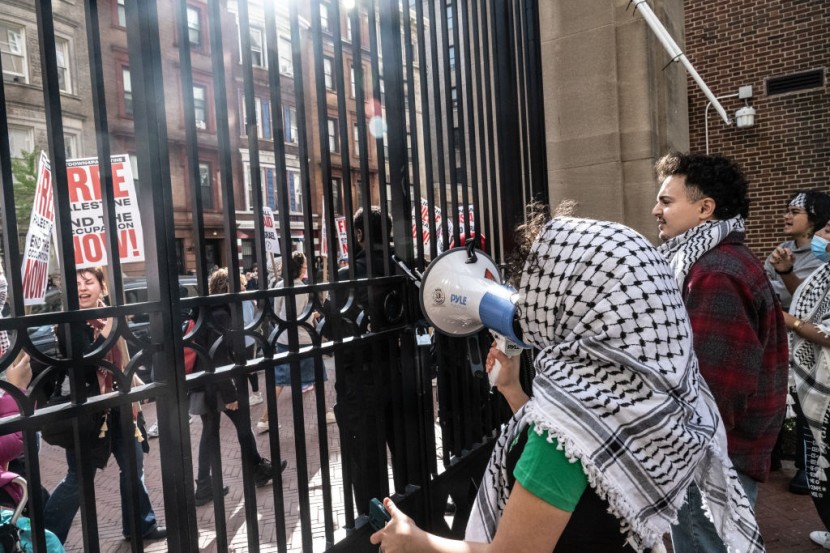
Pro-Palestine protests have continued to spread on college campuses across the United States, with encampments developing at Yale University, New York University (NYU), Harvard University, Massachusetts Institute of Technology (MIT), Tufts University, and more.
The protests were in response to the arrests and student removals at Columbia University, ABC News reported.
Over 100 protesters were arrested last week at Columbia, according to authorities, while others were suspended and removed from campus.
On the other hand, 150 protesters were arrested at NYU and 45 at Yale this week.
The protests on campuses have been largely peaceful, according to school administrators, with some officials, including the NYPD, as well as protesters blaming unaffiliated individuals for instances of violence and offensive rhetoric.
Some students have said that the on-campus tension has created concerns about safety, and some universities have responded by opting for remote or hybrid learning options.
"Students across an array of communities have conveyed fears for their safety and we have announced additional actions we are taking to address security concerns," Columbia president Minouche Shafik said.
"The decibel of our disagreements has only increased in recent days. These tensions have been exploited and amplified by individuals who are not affiliated with Columbia who have come to campus to pursue their own agendas. We need a reset."
Ever since the start of the war between Israel and Hamas on Oct. 7, tensions have been high on college campuses nationwide, with some of them resulting in antisemitic attacks on Jewish students and faculty.
Meanwhile, Harvard suspended the Harvard Palestine Solidarity Committee, a student group that has been under the spotlight, as debate raged on college campuses around the country.
In a statement, the group said that it has faced "unprecedented repression" over the past six months, including doxxing, racist harassment, and targeted administrative crackdowns.
"Harvard has shown us time and again that Palestine remains the exception to free speech," the group told ABC News in a statement.
"After standing idly by as pro-Palestine students faced physical and cyber harassment, death threats and rape threats and racist doxxing, Harvard has now decided to dismantle the only official student group dedicated to the task of representing the Palestinian cause."
Encampments inside MIT were also reported, with protesters calling for an end to the university's funding of the Israeli Ministry of Defense, which has been captured in past university financial reports, including projects such as "autonomous robotic swarms."
"What we've seen is this community that's formed around our demands that basic human dignity be recognized, as this community of fighting for liberation for all," the group MIT Jews for Ceasefire said.
On the other hand, MIT said that it was "aware of the tents, and are determining next steps with a focus on ensuring the campus is physically safe and fully functioning."
"MIT Police were on scene throughout the night and will continue to be present," the university told local broadcaster WGBH.
Meanwhile, Tufts spokesperson Patrick Collins said that officials were "actively and closely monitoring the situation."
"While students are permitted to express their views, including demonstrating on campus, we will hold accountable any community members who engage in conduct that violates university policy," he said.
"Regarding the students' demands, our position on this has been clear and consistent for several years: We do not support the BDS movement."
BDS referred to the pro-Palestinian "Boycott, Divestment, Sanctions" movement against Israel's policy in Palestinian territories.
Over on the West Coast, hundreds of students protesting the war at California's Cal Poly Humboldt have occupied two campus buildings since Monday (Apr. 22).
"Three protesters were arrested overnight stemming from the occupation and confrontation with law enforcement," the institution said in a statement on Tuesday (Apr. 23).
The university said dozens of students remain barricaded in Siemens Hall, using furniture to block the entrance. It also noted that an unconfirmed number of individuals had occupied another campus building.
"The University is concerned about the safety of the students who remain in the building, and has been asking the students to remain open to dialogue around a peaceful resolution," the statement read.
The campus was locked down on Monday when the protests began and would remain closed through Wednesday (Apr. 24), the University added.
In contrast, the student-led organization Humboldt For Palestine said the demonstrators would not leave the campus until the university "divests" from Israel.
"We are not leaving or moving or talking until they have completely divested from Israel," the group said in a statement on Instagram.
Meanwhile, on Tuesday evening, House Speaker Mike Johnson announced he would visit Columbia University the following day to meet with Jewish students.
After the meeting, Johnson is set to deliver remarks and take questions about the rise in antisemitism on college campuses.








